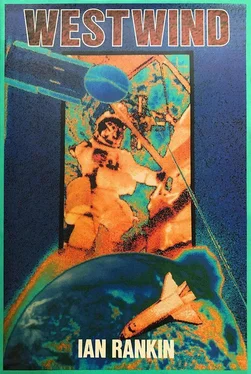‘He’s a Russian spy, though,’ Hepton protested.
‘Yes?’ Parfit didn’t seem to see his point.
‘And you know where he is. Why hasn’t he been arrested? Deported?’
Parfit laughed. ‘Because then they’d just send home some of ours. Besides, it’s nice having him here. It means we can slip him the odd piece. Let him decide whether or not it’s true.’
Hepton shook his head. ‘The more I know, the less sense it makes. What did he mean about Warsaw in ’87?’
‘Oh, we were having a bit of trouble out there. The Polish secret police were cracking down a bit too heavily on our diplomats, being a bit obvious in their operations, that sort of stuff. We could have done something about it ourselves, but we passed on a message to Moscow and let the Kremlin deal with it. They slapped a few wrists, and things calmed down again.’
‘So what does it mean?’
‘It means we’re being allowed to deal with this mess ourselves, without outside interference.’
‘You think he knows what this is all about?’
‘Oh, he’ll have more than an inkling.’ Parfit had dried his face and was now combing his hair. He looked at himself in the mirror and swept a stray strand back behind his ear. ‘More than an inkling,’ he repeated. ‘After all, as you said yourself, Devereux was his man.’ He turned to Hepton. ‘Let’s get Major Dreyfuss and head for my office. If they wanted rid of Devereux, you can bet a shilling they want rid of Dreyfuss too.’
‘But why did they want rid of him?’
‘You mean Devereux? Probably because they realised what his game was, that’s all.’
Hepton stood for a moment, wondering how Parfit could take it all so rationally, so calmly. Then, aware that he was alone now, he made a dash for the door and followed the cool secret serviceman to Dreyfuss’ room.
Dreyfuss was quiet during the short drive towards Westminster Bridge. Hepton sat with him in the back, while Parfit sat with the driver in the front. Parfit had a briefcase on his lap; in it was a cellnet-style telephone, with which he made a steady stream of calls. The driver paid no attention to these, busying himself with the heavy, slow-moving traffic instead. His style of driving was the antithesis of Sanders’: careful, methodical, courteous. All the same, the traffic being what it was — and London drivers being what they were — he had to fall into the shunting rhythm of the cars around him, slamming the brakes on, pulling away fast, then slamming them on again. Each jolt seemed to make Dreyfuss wince. Hepton saw that he was holding his right arm with his good left hand, trying to steady it against unwanted motion.
‘You should have that in a sling,’ he observed. But Dreyfuss did not reply. Parfit, hearing Hepton and glancing in the rear-view mirror, saw the sheen of sweat on Dreyfuss’ forehead, indicative of continuing pain.
‘Take some more tablets,’ he ordered.
‘I’m fed up with being doped,’ Dreyfuss said through bared teeth. ‘I’d rather have pain and all my faculties intact than being in that bloody stupor all the time.’
‘Suit yourself.’ Parfit made another call.
Dreyfuss turned to Hepton.
‘First Jilly. Now Cam. We’re letting these people get away with murder.’ He nodded his head towards the passenger seat. ‘ He’s not going to do anything about it. Not if it involves scandal. He’s paid to cover things up, not let them get into the open.’ Dreyfuss’ voice was becoming conspicuously loud, but Parfit made a show of not listening. ‘If we’re going to do anything, Martin, it’s got to be you and me.’ His eyes, the pupils tiny pinpoints, were boring into Hepton’s. ‘You and me.’
‘Yes,’ Parfit commented, ‘you’ve done so well on your own, haven’t you?’
Dreyfuss made a face at him behind his back, then winked at Hepton. ‘You and me,’ he mouthed noiselessly, before sitting back and watching from his window.
Hepton watched from his window too, but he wasn’t really seeing anything. He was thinking over what Dreyfuss had said; that, and a lot more besides...
Blake Farquharson was waiting for them in Parfit’s office. Hepton had expected that their destination would be Whitehall and the Foreign Office. But in fact they had travelled south, past the Houses of Parliament, over Westminster Bridge and into Westminster Bridge Road. Their destination was a large office block, where passes once more had to be issued before they headed up in the lift towards Parfit’s floor.
Parfit’s office, too, was modern, belying his old-world appearance. The desk was cream-coloured and constructed of metal and plastic and chipboard. The chairs were made from tubular steel, their fabric a gaudy lime-green design. There was a large cabinet against one wall, protected by a steel rod and a tumbler lock. Beside it stood a smaller filing cabinet, again protected from prying eyes. The windows were covered by prodigious quantities of net curtain — to stop glass from a potential bomb blast spraying the room, as Parfit later explained. There were calendars and year-planners on two walls, and a coffee table upon which sat a teapot and three mugs, whose interiors were growing cultures not dissimilar in colour to that of the chair fabric.
And in one chair sat Blake Farquharson, though he stood when they entered.
‘Hello, Parfit.’
‘Good morning, Blake.’ The two men shook hands warmly, like old friends after a separation. ‘You’ve already met Martin Hepton. This...’ Parfit gestured towards Dreyfuss, but Farquharson interrupted.
‘... Must be Major Dreyfuss,’ he said, holding out his hand. Dreyfuss stared at it, but kept his own by his side. Then Farquharson noticed the bandage and brought his outstretched hand up to his mouth, using it to shield an embarrassed cough.
‘We had a spot of bother,’ Parfit explained. He had gone to his desk and was sifting through the mass of paperwork awaiting him. He read the top sheets thoroughly, while the rest of the room kept an awkward silence. Dreyfuss had grabbed one of the chairs and was trying to make himself comfortable. Hepton preferred to stand, and went to the window. Parfit put down the sheets. ‘Sanders’ report,’ he stated.
‘Yes,’ said Farquharson, ‘I read it while I was waiting. I’m not sure about Sanders. He’s keen, but...’
‘That’s his problem,’ Hepton muttered.
‘What’s that?’ Farquharson barked.
Hepton turned to him. ‘Your Sanders,’ he said. ‘He’s all enthusiasm, no brains. I’ll give you an example.’
‘Please do,’ Farquharson said slyly.
‘Okay, when we went to talk to Cam Devereux — who died this morning, by the way, not that you’ll lose much sleep over that small fact — the doorman at the Achilles told us we couldn’t park where we’d parked. Sanders flashed some kind of ID, which the doorman studied.’
‘Yes? Is that all?’
‘No,’ said Hepton. ‘I went back to the hotel this morning. I tried to catch a killer, and a Soviet agent helped me.’
Farquharson’s eyes opened wide, and he looked to Parfit for confirmation.
‘Vitalis,’ Parfit said in a neutral voice. Farquharson nodded.
‘And this Vitalis,’ Hepton continued, getting to his point, ‘stopped on the way out of the hotel to have a few words with the doorman; a few words in Russian.’
‘Is that so?’ Farquharson looked to Parfit again. ‘That’s a useful piece of information.’
But Parfit shook his head. ‘We’ve known about the doorman for a while.’
‘Well, Sanders obviously didn’t know about him,’ Hepton said, his voice increasing by a decibel or two. ‘Besides which, I’ve been thinking over what Mike was saying in the car.’ At the sound of his name, Dreyfuss became attentive. ‘He was saying,’ Hepton continued, ‘that you seem to know a lot but aren’t prepared to do anything about it. It strikes me that he hit the nail firmly on the head. You know about Vitalis but don’t do anything about him; you know about the doorman at the Achilles but don’t do anything about him . And now you know almost everything there is to know about this COFFIN business: it’s to do with satellites, and Buchan airbase, and Major Villiers, and Harry, and General Esterhazy, and most probably my boss Fagin. But’ — he began to space his words for effect — ‘you’re not doing one damned thing about it.’ He paused, and noticed how loud his voice had become. Dreyfuss was smiling encouragement at him and applauded silently as he finished.
Читать дальше












